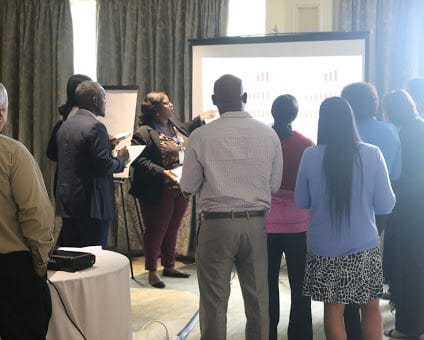Informing policy in the Caribbean
- Case studies from IPCC authors
- Conversation shops in Senegal
- Talking your audience’s language in Indonesia
- Energising analogies in Ukraine
- Flooding conversations in Colombia
- The bigger picture in Japan
- Local stories in Mozambique
- Informing policy in the Caribbean
- Stitching in detail in India
- Connecting personally in Argentina
- Neighbourhood interest in the USA
- Unpacking the science in France
This case study is part of a set of case studies commissioned by the IPCC WGI TSU (Intergovernmental Panel on Climate Change, Working Group I Technical Support Unit) and collected by Climate Outreach.
Prof. Michael Taylor shares how his interactive and locally-oriented activities have helped decision-makers understand what implications climate science has for local policy.

Prof. Michael Taylor, University of the West Indies – Author for Special Report: Global Warming of 1.5oC, 2018, @UWImona
“In the small island context, governments turn to the regional scientists to interpret the IPCC reports and what the significance is for them. My research team and I host two-day climate SMART workshops with technocrats from different small islands. The most recent one in The Bahamas included participants from The Bahamas, Barbados, Belize, Cayman Islands, Haiti, Jamaica and the Turks and Caicos Islands. The workshops cover the basics of climate science through to how the science may influence their decision making.
A variety of engagement methods are used including presentation slides, interactive games and role play – they all help to contextualise the science so that participants can relate to it. We’ve found that using local science depicting historical change, future projections and impacts help participants to engage with the subject, and are also helpful for illustrating the key points from the IPCC reports in a meaningful way. Creating simple buzzwords and phrases such as “Climate and U: Unfamiliar, Unprecedented, Urgent” helps participants to understand and hold on to principles.
It is always enlightening to hear sector workers’ challenges with using climate science and information, and even more rewarding to see, when through the guided exercises and the role play, they come to realise how it is relevant and useful for them.

Photo credit: Jayaka Campbell
My top tip is to decide on the three points you want the audience to leave with before you start, and then use this to frame your entire presentation.”
This case study is a great example of putting the following principles for effective public engagement into practice.
- Principle 3: Connect with what matters to your audience (see Handbook page 11)
- Principle 5: Lead with what you know (see Handbook page 17)
Find out more about the six principles in our Communications Handbook for IPCC scientists and accompanying webinar.

If you would like to contribute a case study of your public engagement experiences as an IPCC author, we would love to hear from you. Please share your stories with the WGI Technical Support Unit directly.
Reports & guides
Sign up to our newsletter
Thank you for signing up to our newsletter
You should receive a welcome email shortly.
If you do not receive it, please check your spam folder, and mark as 'Not Spam' so our future newsletters go straight to your inbox.
